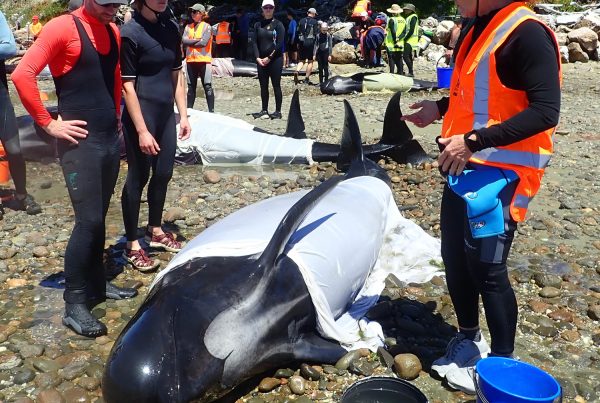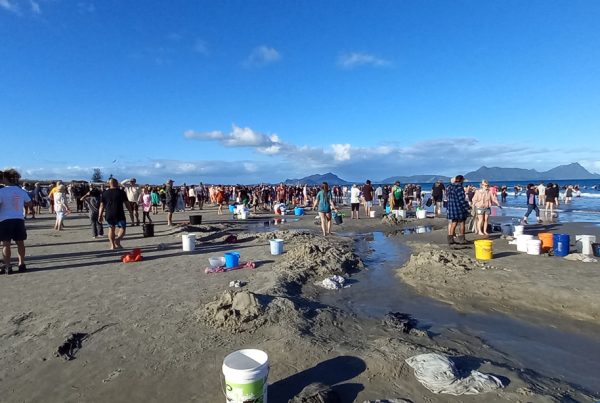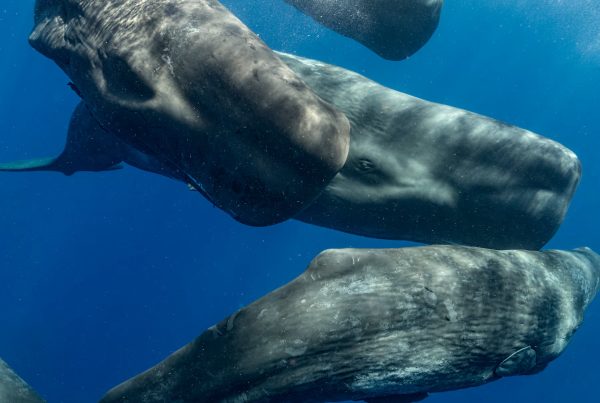
19 January 2025 – Pakawau, Golden Bay, Sunday
On Saturday evening, we received a text message from Project Jonah about a possible stranding at Farewell Spit. After my first stranding in December, I had no doubt about what to do—pack and go early the next morning. This time, I was lucky; my two friends, Jo and Steve, had just completed the Marine Mammal Medic course a few weeks earlier and were able to come along.
The Marine Mammal Medic course I took a year ago was brilliant. I learned so much. We practiced on the beach, but, as with many things in life, nothing can truly prepare you for a stranding. The experience changed my life—in a positive way. It showed me how many people care and are willing to do everything they can to help these animals.
I also found that a stranding exposes your vulnerability. You put in an immense physical and emotional effort to help, and then you wait, day after day, receiving updates: “No sight of whales.” “They restranded.” “They refloated.” And so on. This is why having friends with you is so important. They can share in your emotions—your fears, happiness, and sadness.
So, on Sunday morning, we drove from Nelson to Golden Bay, asking each other questions: Are they still alive? Will we be able to help them?
At the stranding site, we met Project Jonah and DOC staff guiding the crowds toward 30 stranded pilot whales. And there they were:
Lying on the sand.
Motionless.
Breathing slowly.
So majestic, and yet helpless.
The first stage was the easiest—after assessing which whales were alive and strong enough to be refloated, we covered them with wet sheets and gently poured water over them. The harder part began when the tide came in. For safety reasons, only people in wetsuits were allowed to stay in the water.
The water rose quickly. The whales began waking up, calling to each other, reuniting. The younger ones swam toward their mothers, touching them gently. There was a baby whale, just a meter long. As soon as it could swim, it started bumping into us, checking on every whale. It was good to see the baby full of energy. Pakawau Beach is a difficult location, with many shallow bars followed by deep water before reaching the open sea. We spent several hours in the water—sometimes up to our chests—guiding the whales from one shallow section to the next.
After four hours, Project Jonah, DOC, and the Cetacean Ecology Research Group had a long discussion about the pod’s behaviour. They ultimately made the difficult decision to pause the refloat attempt. The pod had lost a few members the night before on the beach—possibly their matriarch. And despite being physically well enough to refloat, they seemed confused and unwilling to leave. It was heart-breaking.
At that moment, Louisa from Project Jonah called all the remaining medics in the water for a briefing. She explained the situation clearly, and I realized that we weren’t going to be able to do any more that day. These beautiful, massive animals simply weren’t ready to go. The next few days at home were exhausting—an emotional rollercoaster of waiting for news of restrandings and refloats. Each stranding teaches me more about whales—and about myself. Having friends with you is so important. And being guided every step of the way by Project Jonah and DOC is priceless.
Anna Wojtacha


